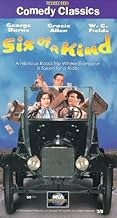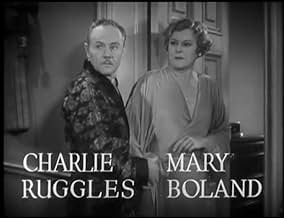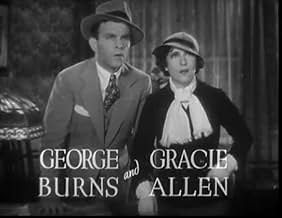Ajouter une intrigue dans votre langueWhen a respectable middle-class couple take a cross-country trip by auto, they share expenses with a decidedly oddball couple, none of whom know the car carries embezzled funds.When a respectable middle-class couple take a cross-country trip by auto, they share expenses with a decidedly oddball couple, none of whom know the car carries embezzled funds.When a respectable middle-class couple take a cross-country trip by auto, they share expenses with a decidedly oddball couple, none of whom know the car carries embezzled funds.
- Réalisation
- Scénario
- Casting principal
- Récompenses
- 1 victoire au total
- J. Pinkham Whinney
- (as Charlie Ruggles)
- Traffic Cop
- (non crédité)
- Hotel Desk Clerk in Philipsburg
- (non crédité)
- Eyeshade Man
- (non crédité)
- Detective
- (non crédité)
- Woman
- (non crédité)
- Gillette's Secretary
- (non crédité)
- Drunk
- (non crédité)
- Tourist's Wife
- (non crédité)
Avis à la une
*** (out of 4)
A couple (Charles Ruggles, Mary Boland) are about to go on their second honeymoon when the wife gets the bright idea to save some money by placing an ad in the paper hoping to get another couple to go along and share expenses. A couple (George Burns, Gracie Allen) agrees to go but it's just one disaster after another especially when they get to a small town with a mixed up sheriff (W.C. Fields). Considering the cast you'd think this Leo McCarey comedy would be much better known but it's pretty much been forgotten over time. While it's far from a classic comedy there are enough good moments to make it worth sitting through and especially with a 62-minute running time. The biggest thing going against the movie is its screenplay, which really isn't all that good. At just 62-minutes it seems as if the movie is broken down into six, ten-minute vignettes and it really gives the movie a somewhat uneven film. With that said, enough of those vignettes work thanks in large part to the cast. Ruggles and Boland are very good together and share some great comic timing and especially in some early scenes dealing with how much she paid for the ad. Burns and Allen really don't get too much to work with as the screenplay pretty much keeps him in the background while she gets to play dumb. Even Fields role isn't the greatest but the comic legend does what he can with it. The real star of the film goes to the wonderful dog who is downright hilarious during his scenes and especially the ones where he's pushing Ruggles around.
But the value of "Six of a Kind" is more an artifact of particular players forever captured on film. Mary Boland is always excellent and she's wonderful here (but at her best a few years later in "The Women"). Charlie Ruggles essentially played the same role all his career and nobody plays Charlie Ruggles better. Alison Skipworth is barely utilized at all, here.
It's the preservation of W.C. Fields' immortal "Honest John" routine from vaudeville that earns "Six of a Kind" its place in film history. It's difficult to imagine how this routine worked from the distance of a stage. But on film it's a miracle of comic construction, timing, delivery and skill (yes he actually ricochets that billiard ball off the far end of the table where it bounces back and hits his forehead). The routine is hypnotic and hysterical, and perfectly pitched for film.
It's always fascinating how certain plot premises can be worked for either highballing comedy to a deadly serious situation. Mary Boland of the ditzy and Charlie Ruggles of the henpecked play their usual characters who are planning to motor all the way to California. To share expenses they advertise for someone to share the ride. They get Burns and Allen and a monster of a dog. That same premise was a deadly serious one several generations later in Kalifornia.
Of course if you're traveling with Gracie Allen you know you're going to be going absolutely nuts trying to figure her Monty Pythonesque reasoning about the whole world. And if that ain't enough you get to run into W.C. Fields, part time sheriff and full time pool hustler who's living in sin with Alison Skipworth. But back then we didn't delve into such things.
A real classic comedy from the thirties, not to be missed.
Le saviez-vous
- AnecdotesOne of over seven hundred Paramount Pictures productions, filmed between 1929 and 1949, which were sold to MCA/Universal in 1958 for television distribution, and have been owned and controlled by Universal ever since. Local sponsor interest was minimal, and its initial television broadcasts were few and far between. Its earliest documented telecast took place in Denver 25 May 1959 on KBTV (Channel 9); it first aired in Miami Saturday, April 2, 1960 on Comedy Playhouse on WTVJ (Channel 4). It was released on DVD February 4, 2003 as one of three George Burns and Gracie Allen films, and again November 15, 2016 as a single as part of the Universal Vault Series.
- GaffesGeorge Burns' character Name is shown onscreen as "George Edward", but "Edwards" is consistently spoken as his surname.
- Citations
Gracie De Vore: Oh, what's that?
George Edwards: You wouldn't understand. This is a map.
Gracie De Vore: Oh, sure, I know what a map is. It's what you take every afternoon when you're tired. I always take an afternoon map.
George Edwards: An afternoon map?
Gracie De Vore: Sure.
George Edwards: I bet when you went to school, you never even reached the fifth grade.
Gracie De Vore: Aw, don't be silly. I spent three of the happiest years of my life in the fifth grade.
- ConnexionsFeatured in L'univers du rire (1982)
Meilleurs choix
Détails
- Date de sortie
- Pays d’origine
- Langue
- Aussi connu sous le nom de
- Six of a Kind
- Lieux de tournage
- Société de production
- Voir plus de crédits d'entreprise sur IMDbPro
- Durée1 heure 2 minutes
- Couleur
- Rapport de forme
- 1.37 : 1
Contribuer à cette page






































